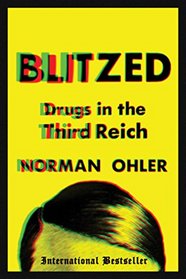The author shares with readers the excellence of the late 19th C. and 20th C. German pharmaceutical industry in efficiently producing unadulterated products. But a few days after inventing aspirin, heroin was first created. 'Party drugs' were popular during the Weimar Republic days, but frowned upon in 1933 and thereafter. However, Mr. Ohler's research in the archives finds that drugs were issued to soldiers, sailors, and flyers 1939-1945 so they could put off sleep time. The author begins by visiting the abandoned premises of the firm that made Pervitin (methamphetamine) and then explaining how popular it was on the civilian market (a successful grassroots advertising campaign) and later the military placed orders for millions of tablets.
"A general rule of thumb in military strategy is than an attacker must be superior by 3:1 to be able to carry out a successful invasion. No wonder then that the Wehrmacht High Command struggled to devise a successful plan. Hitler refused to acknowledge these realities and was convinced the Aryan warrior's soul would achieve dominance against the odds. Again and again, mistakenly inspired the military's doped performance on the Polish campaign, he spoke of 'miracles of courage of the German soldier." Privitin allowed Guderian's tanks to drive forward day after day, per the evidence found by the author, who finds the pills were essential to that victory. But Mr. Ohler also offers evidence of the bunglers who mismanaged the war effort while high on drugs and alcohol.
We read of the notorious Dr. Morell in the studies of Hitler published in the 1960s, but here we found he was a very popular physician before Hitler insisted he join the entourage. Mr. Ohler also notes that the natural herbs needed were grown at Dachau so that they need not be imported. Also that the doping of DDR athletes after the war was done using a physician who learned his 'trade' during the war. Morell acquired confiscated factories to produce his concoctions, demanded railcars to transport his goods instead of war materials, and was on the verge of becoming wealthy when the Third Reich collapsed. He was very lucky to be fired by Hitler on 21 April 1945 and be flown south over the USSR and American lines to rusticate there. It had become almost impossible to obtain pharmaceuticals given the bombing of manufacturing buildings and retail pharmacies and thus Hitler was suffering withdrawal. The doctor kept careful records of what he giving Hitler and uses those facts to tie the drugs to some of Hitler's command decisions.
"Perhaps thge Fuhrer and the troops were cast from the same mold--thety were, at least, taking the similarly powerful substances. Heye's assertion that the pilots climbed enthusiastically into their doomed vehicles was pure cynicism. These involuntarily spaced-out men certainly didn't want to belong to a 'fighting elite' anymore. What happened here was that their last reserves had just been chemically unlocked."
Good illustrations, notes, bibliography, index.
"A general rule of thumb in military strategy is than an attacker must be superior by 3:1 to be able to carry out a successful invasion. No wonder then that the Wehrmacht High Command struggled to devise a successful plan. Hitler refused to acknowledge these realities and was convinced the Aryan warrior's soul would achieve dominance against the odds. Again and again, mistakenly inspired the military's doped performance on the Polish campaign, he spoke of 'miracles of courage of the German soldier." Privitin allowed Guderian's tanks to drive forward day after day, per the evidence found by the author, who finds the pills were essential to that victory. But Mr. Ohler also offers evidence of the bunglers who mismanaged the war effort while high on drugs and alcohol.
We read of the notorious Dr. Morell in the studies of Hitler published in the 1960s, but here we found he was a very popular physician before Hitler insisted he join the entourage. Mr. Ohler also notes that the natural herbs needed were grown at Dachau so that they need not be imported. Also that the doping of DDR athletes after the war was done using a physician who learned his 'trade' during the war. Morell acquired confiscated factories to produce his concoctions, demanded railcars to transport his goods instead of war materials, and was on the verge of becoming wealthy when the Third Reich collapsed. He was very lucky to be fired by Hitler on 21 April 1945 and be flown south over the USSR and American lines to rusticate there. It had become almost impossible to obtain pharmaceuticals given the bombing of manufacturing buildings and retail pharmacies and thus Hitler was suffering withdrawal. The doctor kept careful records of what he giving Hitler and uses those facts to tie the drugs to some of Hitler's command decisions.
"Perhaps thge Fuhrer and the troops were cast from the same mold--thety were, at least, taking the similarly powerful substances. Heye's assertion that the pilots climbed enthusiastically into their doomed vehicles was pure cynicism. These involuntarily spaced-out men certainly didn't want to belong to a 'fighting elite' anymore. What happened here was that their last reserves had just been chemically unlocked."
Good illustrations, notes, bibliography, index.




